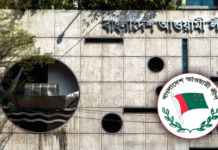Detectives find at least 10 gangs involved; lax checking by courier services made the crime easy
Bangladeshi members of a transnational drug cartel smuggled around 150 kilograms of heroin to the UK through Bangladesh in the last 12 years, taking advantage of the lax security checking system of some courier services.
At least 10 local gangs have couriered the deadly drug in around 250 consignments, hiding them in shoes, leatherjackets and books after Pakistani agents had brought them to Bangladesh from Pakistan and Afghanistan, detectives say.
Detectives learnt about these gangs and their smuggling process after the arrest of Shamsul Arefin Tuhin, a local member of the international gang, in the capital in September.
On information from Tuhin that a Bangladeshi-born British citizen named Shah Alam Suman, a Pakistani national and some British nationals had been operating from the UK, Bangladeshi detectives sought help from the International Police (Interpol) to nab the gang.
Deeply concerned, British High Commission officials in Dhaka contacted the DB officials and told them that the British government might as well send a team of its secret service to help investigate the gang’s activities here.
“If necessary, British intelligence will work jointly with the Bangladeshi detectives to bust the network,” said Mashiur Rahman, additional deputy commissioner of DB.
He added that Immigration Liaison Officer of the High Commission, Shaun Antun, recently met the detectives and talked with those arrested in this connection.
“Upon our request, the High Commission has already given us the passport information of Suman and requested us to share with it information about the local agents of the gang.
“The High Commission authorities are also willing to send their secret service, MI6, to Bangladesh,” Mashiur added.
Touhidul Islam, assistant commissioner of DB, said the gang preferred the branches of international courier services in Bangladesh to those in Pakistan, as the branches here lack a rigorous security mechanism.
“We have spoken with the authorities of the branches of six courier services that operate globally. They said they did physical checking before sending a parcel abroad as most of them had no scanner. A few others do not even bother to open the parcels,” he said, “Physical checking cannot detect illegal objects hidden, say, in a shoe case.”
He claimed that they never received any complaint from the receiving end about finding drugs in those packages.
After his arrest, Tuhin told detectives that Suman used to call him over the phone to give him a code and a location to meet Pakistani agents. Every time, he would be asked to go to a new location where he would meet new agents.
Tuhin used to get Tk 20,000 for receiving and then couriering each package of 250 grams of heroin, detectives said, quoting Tuhin who had been with the gang for five years.
During interrogation, he named a number of the gang members — Liton of Sunamganj, Ali of Feni and Zakir of Noakhali — but claimed they all worked separately. Police are yet to arrest them.
The law enforcers first came to know about the gang after the arrest of Imran Hossain Jitu, an accused in a murder case, with some heroin in August. Jitu told the police that he had bought the drug from an employee of Aramex Courier Service in Savar, on the outskirts of the capital.
On information gleaned from Jitu, police detained four Aramex employees — Sadekul Alam, Md Shohag, Sreebash Poddar and Mohsin Sarder. They told the police that they found the drug in a packet of shoes to be couriered to Suman in the UK.
“The employees sold half the heroin and returned the other half to its sender, Tuhin. We arrested Tuhin from the address mentioned on the package,” said Nibaran Chandra Barman, an inspector of the DB.
“We submitted the formal charge sheet against the arrestees and they all gave confessional statements before the court. If we can arrest Suman, his name will be included in the case,” added Nibaran, also the investigating officer of the case.
According to the package seized from Tuhin, Suman’s address is 150, Fernley Road, Spark Hill, Birmingham, UK. But the police are yet to be confirmed about the address and his whereabouts. Detectives in Dhaka are still awaiting an update from the Interpol.
In the wake of the arrests and the revelation, the international courier services in Bangladesh and the government postal service department last month decided to work together with the police to curb drug trafficking, said Enayet Hossain Khan, financial manager of Aramex Courier Service.
“The police have advised us to introduce electronic checking system and keep detailed information of the customer, including a photocopy of his national identity card, before booking a parcel,” he told The Daily Star.
He added though courier services do not scan the parcels for themselves, all the packages are scanned twice or thrice by the airports authorities before they are finally delivered to the recipients.
“Maybe the gangs have some unique systems of packing goods to dodge scanners at airports or simply they maintain strong networks to ‘manage’ officials at airports,” he said.
The courier services that operate internationally and have offices in Bangladesh include Aramex, DHL, FedEx, TNT Express and UPS.
Asked about the present status of investigation into the matter in the UK and Suman’s whereabouts, a British High Commission spokesperson in Dhaka said in an email, “The UK works with a variety of close international law enforcement partners in the region in order to tackle the threat of drugs to the UK. We are unable to comment on specific cases though.”
The spokesperson would not like to be named.
In his email to this correspondent on October 19, he also did not comment on Immigration Liaison Officer Shaun Antun’s conversation with the detectives and the arrestees.
It may be mentioned that the UK customs in May 2005 accused five Bangladeshi business firms — BD Foods Ltd, Emdad Traders, Jamil International, MM Enterprise, and Green Haven Enterprise — of smuggling 75.5kg of heroin to that country in the name of food, toiletries, cosmetics and tiles.
Source: The Daily Star










